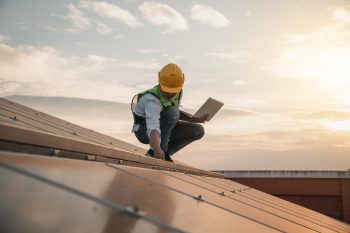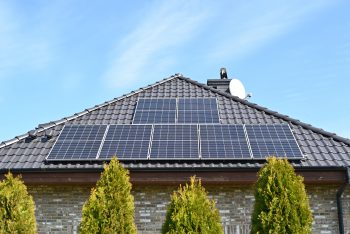ICC Voters Hear Opposition From 318 Clean Energy Companies Amid Code Proposal Vote
WASHINGTON, D.C. — More than 315 leading clean energy companies are calling on International Code Council (ICC) voters to reject a code proposal from FEMA that will upend U.S. clean energy progress, and instead, approve a set of compromise solutions.
The proposed FEMA change to the 2024 International Building Code, S76-22, would require solar, storage and wind projects to meet Risk Category 4 requirements, the most stringent category possible.
“The stated goal of FEMA’s proposal is increased grid reliability, but when you needlessly make it harder to build resilient clean energy, the obvious effect is a reduction in reliability,” said Abigail Ross Hopper, president and CEO of the Solar Energy Industries Association (SEIA). “This overreach is being made in an opaque process without input from experts on economic impacts, electric reliability and climate change. America’s solar and storage industry is urging International Code Council voters to consider the real-world impact of this code and approve SEIA’s compromise proposals.”
FEMA officials themselves confirmed they support the proposals put forward by SEIA and supported by the Distributed Wind Energy Association (DWEA), according to oral testimony on Sept. 15 and a voter’s guide that FEMA mailed out to voters on Oct. 13.
This compromise framework (S79-22 and S81-22) includes an important carve-out for solar projects to be designated as Risk Category 2. It balances a significant increase in the structural requirements for solar facilities with enough breathing room for project construction to move forward.
By contrast, the FEMA proposal will require clean energy projects, which are critical to fighting climate change, to be built to withstand damaging natural disasters far beyond what is needed. The result will be a dramatic spike in construction costs and dozens of gigawatts of cancelled clean energy projects, without improving electricity reliability.
“The FEMA proposal is well intended, but not well considered,” said Mike Bergey, president of DWEA. “It’s like saying that the cars for VIP’s should be bulletproof and then requiring all cars to be bulletproof. Besides that, FEMA totally misses that the grid is the weakest link and requiring more steel and concrete on solar and wind installations won’t strengthen the power grid.”
The voting period for ICC members runs from Oct. 17 through Nov. 1.
Learn more about the impact of FEMA’s code change proposal.
###
About SEIA®:
The Solar Energy Industries Association® (SEIA) is leading the transformation to a clean energy economy, creating the framework for solar to achieve 30% of U.S. electricity generation by 2030. SEIA works with its 1,000 member companies and other strategic partners to fight for policies that create jobs in every community and shape fair market rules that promote competition and the growth of reliable, low-cost solar power. Founded in 1974, SEIA is the national trade association for the solar and solar + storage industries, building a comprehensive vision for the Solar+ Decade through research, education and advocacy. Visit SEIA online at www.seia.org and follow @SEIA on Twitter, LinkedIn and Instagram.
Media Contact:
Morgan Lyons, SEIA’s Director of Communications, mlyons@seia.org (202) 556-2872



